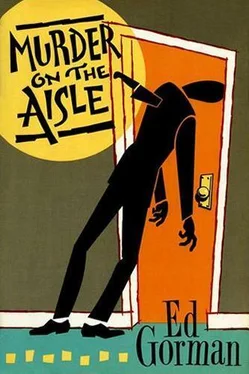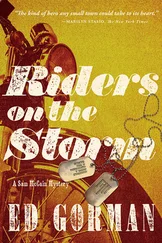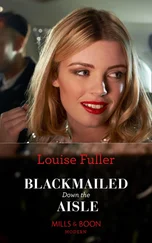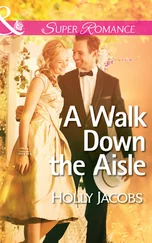“Hey, man, Neil’s cool.”
“Right, Neely. Neil’s cool.”
So they went to Walley’s, a sit-down place with live waitresses and everything. Neely made a semi-drunken pig of himself trying to eat his burger (the meat kept sliding out of the bun and the ketchup and the mustard got smeared all over his mouth and hands and all over the table, mostly thanks to the fact that Neely always had them pile lots of extra vegetables on the burger so that absolutely nobody could manipulate such a monstrosity), and he replied to every third sentence of Tobin’s by saying “Wow, that’s neat,” or “What a downer.”
So after Tobin got all through running down the past twenty-four hours — how he’d taken a poke at Dunphy last night; wrestled around on the studio floor tonight; been seen being kissed by Jane Dunphy — what did Neely say? “Now that’s a bummer.”
“Yeah. At least.”
“I heard of this Huggins guy. A real bad ass. Law-and-order type with some kind of vague political aspirations.”
“He reminds me of Frog Face McGraw.”
“That a boxer?”
“No, an eighth-grade bully.”
Neely tried his hamburger again but without any appreciable success. “That’s the problem with having them put on extra vegetables. Shit gets all over.”
“So I noticed.”
Neely wiped his mouth with the back of his hand.
Tobin said, “I’d like to introduce you to napkins,” and handed him one. “They’re on the market this month but they’re probably going to prove very popular.”
“So I’m a slob.”
“You weren’t years ago. Back when we were in college.”
“It mattered then.”
“What mattered?”
“Everything — living, I guess.”
“Living doesn’t matter now?”
“Not really. It’d all be easier if the world would just end tomorrow — then all the injustice and all the bullshit would be taken care of. Purification.”
Tobin smiled wearily, thinking of a running battle they’d had. “Yeah, but who would buy all the Barbra Streisand records?”
“You still don’t like her, huh?”
“Hate her.”
“You never did have any taste.”
The waitress came with more coffee. She looked at what Neely had done to himself. She looked genuinely disgusted.
When she went away, Tobin said, “Neely, look at me.”
“Huh?”
“Look at me. At my eyes.”
“What about ’em?”
“I’m scared, Neely. They’re really going to try to hang this fucking thing on me.”
“Sounds like it.”
“So you gotta help me.”
Neely put his burger down. “Really, Tobin. I’m trying to help you by saying I wouldn’t hire me if I were you.”
“You’re good. Or you used to be. You won a lot of cases when you were in the Da’s office.”
Neely shook his head. “You really want me to represent you?”
“Yeah I want you to get all that ‘purification’ crap out of your head and put on a clean shirt and a clean tie and represent me. All right?”
Neely shrugged. “All right, my friend. Then if you want my advice, the first thing to do is make a list.”
“What kind of list?”
“A list of all the people who wanted to kill Dunphy. That’s what the cops used to do when I worked in the Da’s office. They had more lists than they had brains.”
“God, it’d fill a notebook.”
“Yeah, in his case I guess it would. Just do a top-ten sorta thing then. You know, like Dick Clark and American Bandstand .” His voice went falsetto. “ ‘Oh, look, Frankie Valli’s number two!’ Like that.”
“Should I put Jane down?”
“His wife?”
“Yeah.”
“You think she’s a possibility?”
Tobin sighed. “Christ, I feel guilty even thinking it.”
“Thinking what?”
“Well, tonight, she talked about how they were going to try again. That was earlier — then, later tonight when I saw her I sensed — I don’t know how to explain it.”
“You still in love with her?”
“God, I don’t know how to answer that. I really don’t. I just assumed I was for so long — but I’m not sure.”
“Then if you’re not sure about your feelings it won’t be so hard.”
“What won’t?”
“Putting her on the list.” Neely made a broad circling gesture with his finger. The waitress, who looked as if she were pissed off at the universe in general and at Neely and Tobin in particular, came over and said, “Yeah.”
“Paper.”
“What?”
“May I have a piece of your order pad?”
“That’s the only thing I’ll give you a piece of.”
“Funny material.”
She ripped off a sheet of her pad as if she were slicing a knife across his throat.
“She may not be the woman I’ve been waiting for after all,” Neely said as the waitress left, and loudly enough so that she’d be sure to hear him. Then he took from inside his sports jacket a ballpoint pen, clicked it, then turned the sheet over to the blank side and wrote something at the top.
He handed the sheet to Tobin. “There.”
Tobin looked at it. “Jesus.”
“You’re going to need remedial reading, my friend. It doesn’t say Jesus, it says Jane.”
“The woman I love.”
“The woman you-assume-you-love-but-don’t-know-for-sure. I think that’s how you put it, anyway.”
“Then who’ll be number two?”
“How the hell do I know? That’s where you come in. Sit up all night and by morning you’ll have your top ten.”
“Jane,” he said. “Jane.” He sounded as if he’d been hit by a hammer.
Neely was sober enough to drive. They stood at his car in neon-splattered snow banks, their breath silver, shaking hands. A computer sign across the street in a display window said FOUR SHOPPING DAYS TILL XMAS. (He was enough of a Catholic yet that “Xmas” still grated — you didn’t celebrate the birthday of X, you celebrated the birthday of Christ.)
“Maybe by tomorrow the cops will have given up on me and gone after the real killer.”
But Neely was no help. “You look too good. Unless somebody a whole hell of a lot better-looking comes along, they’re going to concentrate on you.”
“Jesus, what do we pay those bastards for, anyway?”
“To find new ways of taking bribes, what else?”
Neely laughed then. “Man, Tobin, you look worse than you did the night you found out your first wife was having an affair with that art instructor.”
“Having an affair while she was two months pregnant with our son.”
“It’s a bitch of a world,” Neely said as he turned to be caught up in the shadows outside the neon. “Come on, I’ll give you a ride.”
“No, it’s too far out of your way. There’s a cab parked up there.”
“You sure?”
“I’m sure. Thanks anyway.”
“Okay.”
Then Neely left, fading into the gloom until the interior lights of his car went on halfway down the long block.
Then he was gone and Tobin stood there for a time before walking over to the cab, as if he hadn’t a clue where to go or what to do with himself.
Which he didn’t.
Wednesday: 10:35
In the days when Tobin had been an entertainment writer for a newspaper over in Jersey, he’d often received invitations to press screenings late, sometimes on the same day that the screenings were being held. Despite the fact that most of the good movie reviewing in the United States is done in the pages of newspapers, studios, courting glitz and glamour, had a decided pecking order. Time and Newsweek reviewers (the very good Richard Corliss, the erratic David Ansen) could have screenings virtually anytime they wanted them. (“You have a cold today? Don’t worry, we’ll bring the movie to your condo and set up a theater right in your living room.”) So could Ebert and Siskel and certainly anybody from The New York Times (including the plucky and undervalued Janet Maslin). But not a mere newspaper reporter from New Jersey. Of course, that all changed when the Tobin-Dunphy (or Dunphy-Tobin, as Dunphy always thought of it) TV show went from local to syndicated. Then, boy, the studios became virtual toadies and started offering to let them see movies far in advance of simple journalists, and in circumstances that Tobin-Dunphy (or Dunphy-Tobin) chose.
Читать дальше












